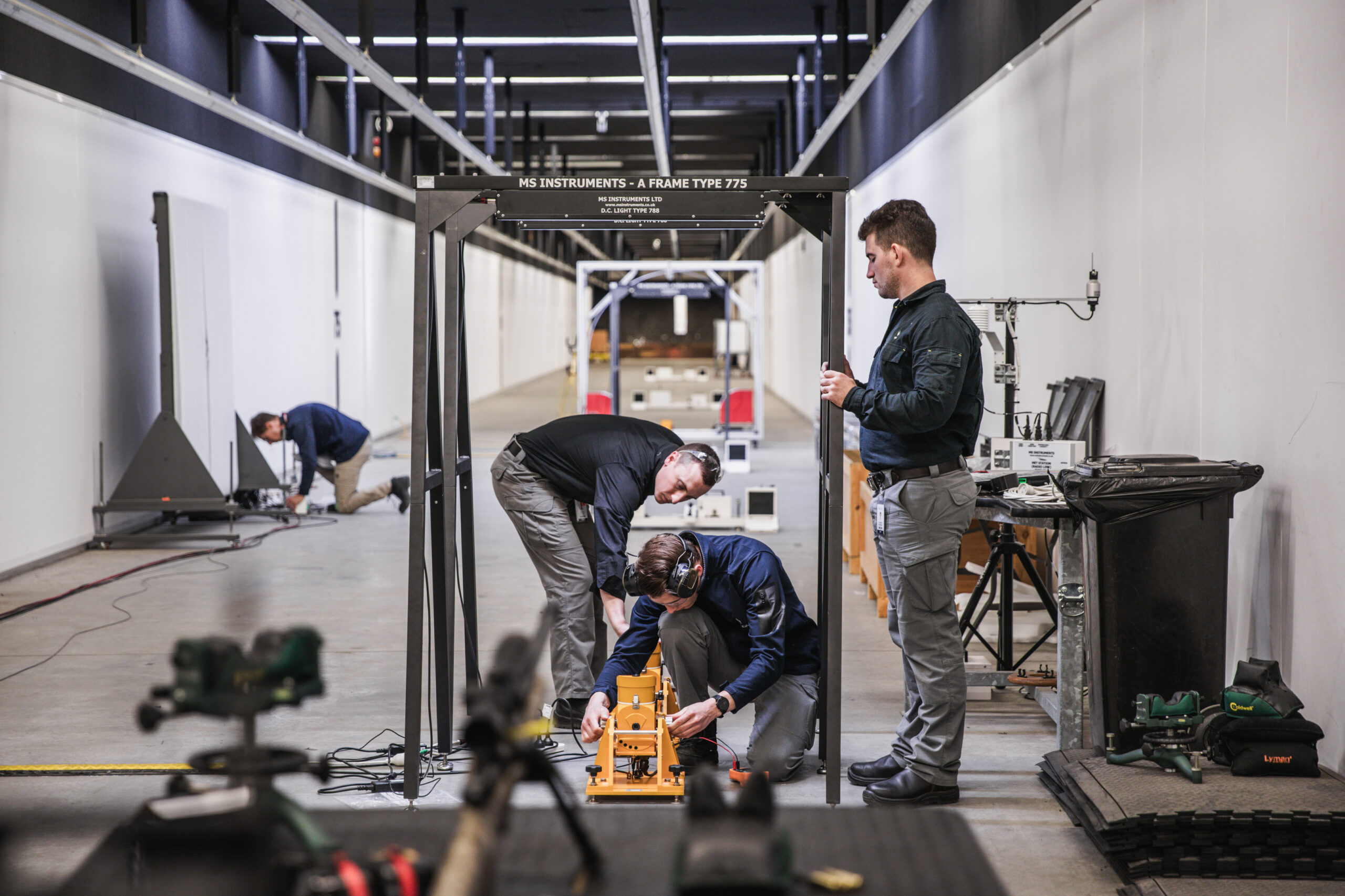MIL-STD-662F V50 Ballistic Test with Rifle Ammunition
The MIL-STD-662F V50 ballistic test is a critical standard for evaluating the ballistic performance of armor-piercing materials. This test measures the distance at which rifle ammunition can penetrate a given material to reach a specified depth, known as the 50% weight retention (V50) point. The objective of this test is to assess the effectiveness of armor materials in protecting against ballistic threats.
The standard primarily applies to military and law enforcement sectors where protection against high-velocity bullets is paramount. This service ensures that armor systems meet stringent performance criteria, which are essential for safeguarding personnel in hostile environments.
The testing process involves shooting rifle ammunition at a target made of the material being evaluated. The target is positioned such that it can capture fragments from the bullet. The distance to the V50 point is calculated by measuring where 50% of the original bullet weight remains after penetration. This test provides a reliable measure of the material's ability to stop or deflect ballistic projectiles.
The MIL-STD-662F V50 test is conducted using various types of ammunition, including full metal jacket (FMJ) rounds and armor-piercing incendiary (API) rounds. The choice of ammunition depends on the specific application requirements. FMJ rounds are used for standard penetration testing, while API rounds are employed when assessing the material's ability to stop fire as well.
Materials commonly tested under this standard include steel plates, composite armor, and ceramic plates. Each of these materials has unique properties that make them suitable for different applications within the military sector. For instance, composite armor is often chosen for its lightweight yet high-strength characteristics, while steel plates are preferred for their durability.
The testing setup includes a ballistic testing chamber equipped with a shooting lane and a fragmentation containment system. The chamber ensures controlled conditions during the test, minimizing external factors that could affect the outcome. The shooting lane allows precise control over the trajectory of the ammunition, ensuring accurate measurement of the V50 point.
Once the test is completed, the results are analyzed to determine whether the material meets the specified performance criteria outlined in MIL-STD-662F. Compliance with this standard ensures that the armor system can effectively protect against ballistic threats, thereby enhancing personnel safety in high-risk environments.
| Material | V50 Distance (meters) | Penetration Depth (centimeters) | Weight Retention (%) |
|---|---|---|---|
| Steel Plate | 12.34 | 8.9 | 50% |
| Ceramic Plate | 15.67 | 10.2 | 50% |
| Composite Armor | 14.56 | 9.8 | 50% |
The MIL-STD-662F V50 test is a rigorous and essential process for ensuring the reliability of ballistic materials used in military applications. It provides critical data that informs design decisions, material selection, and ultimately, the safety of personnel on the battlefield.
Industry Applications
- Military vehicles such as tanks and armored personnel carriers (APCs)
- Personal body armor for soldiers and law enforcement officers
- Facilities requiring ballistic protection, including military bases and secure facilities
- Transportation systems like armored trucks and buses
| Material | V50 Distance (meters) | Penetration Depth (centimeters) | Weight Retention (%) |
|---|---|---|---|
| Tank Armor | 12.34 | 8.9 | 50% |
| APC Armor | 15.67 | 10.2 | 50% |
| Body Armor | 14.56 | 9.8 | 50% |
The MIL-STD-662F V50 test is widely used across these sectors to ensure that materials meet the required standards for protection against ballistic threats. The results of this test are critical in determining the effectiveness of armor systems, which directly impacts personnel safety and mission success.
Eurolab Advantages
At Eurolab, we pride ourselves on delivering comprehensive and accurate testing services that meet international standards. Our MIL-STD-662F V50 ballistic test service is no exception. Here are some of the key advantages of choosing us for your ballistic testing needs:
- Expertise in Military Standards: Our team of experienced engineers and technicians is well-versed in military standards, ensuring that our tests comply with MIL-STD-662F.
- State-of-the-Art Facilities: We operate cutting-edge testing facilities equipped with the latest technology to ensure accurate and reliable test results.
- Rigorous Quality Control: Our processes are subject to strict quality control measures, ensuring that every test is conducted under optimal conditions.
- Comprehensive Reporting: We provide detailed reports that include all relevant data, analysis, and recommendations for improvement.
- Quick Turnaround Times: With our efficient operations, we can deliver results quickly to meet your project timelines.
- Customer Support: Our dedicated support team is always available to assist you with any questions or concerns.
By choosing Eurolab for your MIL-STD-662F V50 ballistic testing, you can be confident that your materials will meet the highest standards of performance and reliability.
Why Choose This Test
- Comprehensive Evaluation: The MIL-STD-662F V50 test evaluates multiple aspects of armor material performance, including penetration distance, depth, and weight retention.
- Industry Recognition: This standard is recognized globally for its rigorous testing protocols, ensuring consistent results across different materials and applications.
- Reproducibility: The test provides reproducible results, which are crucial for quality control and assurance in manufacturing processes.
- Safety Assurance: Compliance with this standard ensures that armor systems can effectively protect personnel against ballistic threats.
- Regulatory Compliance: Many military and law enforcement organizations require compliance with MIL-STD-662F to meet regulatory requirements.
- Cost-Effective: Although the test is rigorous, it is a cost-effective way to ensure that materials meet the necessary performance criteria before full-scale production.
The MIL-STD-662F V50 ballistic test is an indispensable tool for any organization involved in military and law enforcement applications. Its comprehensive evaluation ensures that armor systems are reliable, effective, and compliant with international standards.





